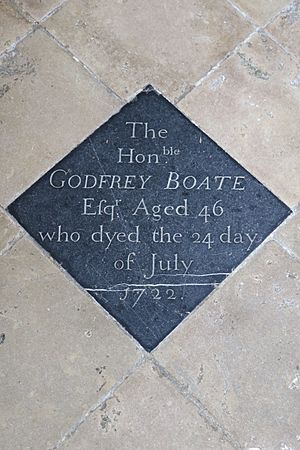Godfrey Boate facts for kids

Godfrey Boate (born between 1673 and 1676 – died 1722) was an Irish judge. He is mostly remembered today because Jonathan Swift, a famous writer, really disliked him. Swift even wrote a funny, mocking poem called Quibbling Elegy on Judge Boat after Boate died.
Contents
Who Was Godfrey Boate?
Godfrey Boate was born in County Tipperary, Ireland. He was the oldest son of Godfrey Boate senior. There's a small question about his exact birth year. His memorial says he was 46 when he died, which would mean he was born in 1676. However, most records suggest he was born in 1673.
His family, the Boates, originally came from a place called Gorinchem in the Netherlands in the 1640s. They were quite important landowners in Tipperary. Godfrey's grandparents, Gerard Boate and Catharina Menning, were given these lands. Gerard Boate was known for writing a book called The Natural History of Ireland. Even though his family owned a lot of land, Godfrey himself didn't seem to be very rich. He actually died with a lot of debt.
Boate's Career Path
Godfrey Boate went to school in Dublin and then studied at Trinity College Dublin in 1692. That same year, he joined Gray's Inn, which is a place where lawyers train in London. He later became a lawyer in Ireland, known as being "called to the Irish Bar".
Godfrey didn't seem interested in politics. He was the only Irish judge of his time who never served in the Irish House of Commons, which was like their parliament. After working briefly as a Master in Chancery (a legal role), he became the Prime Serjeant in 1716. This was a very important legal position.
The next year, he became a judge in the Court of King's Bench (Ireland). This court dealt with major legal cases. Some people, like the legal historian Francis Elrington Ball, thought Boate wasn't really good enough to be a judge. Jonathan Swift, who knew Boate well and disliked him, would have strongly agreed with this opinion. Another important judge, Sir Richard Levinge, also had a very low opinion of Boate and most of his fellow judges.
His Death and Family Life
Godfrey Boate passed away in the summer of 1722 from a condition called dropsy, which caused swelling in the body. He was visiting his wife's family in England at the time. He was buried in All Saints' Church, Hillesden, in Buckinghamshire, England. You can still see his memorial there today.
He was married to Cary Denton. She was the oldest daughter of Alexander Denton and Hester Herman. Cary was also the sister of Sir Edmund Denton and another judge named Alexander Denton. Cary died in 1739 and is buried next to her husband.
They had at least two daughters:
- Lucy: She married Rev. Thomas Hemsworth. They inherited the Boate family lands in Tipperary. However, it seems her father's debts made these lands very difficult to manage. In 1728, a special law was passed to sell the Tipperary lands. This was done to help pay off Judge Boate's many debts.
- Mary: She married Godfrey Clayton. Mary died in 1772 and is buried with her husband, father, and mother in All Saints' Church, Hillesden.
The Waters' Case
In 1720, a printer named Edward Waters was in trouble with the government. He had printed a pamphlet written by Jonathan Swift called Proposal for the Universal Use of Irish Manufacture. The government accused Waters of "seditious libel," which meant saying things that encouraged people to rebel against the government.
Waters was tried in a court where Judge Boate and William Whitshed, the main judge of Ireland, were in charge. Boate didn't play a big role in the trial because Whitshed, being the senior judge, controlled everything. Many people criticized how Whitshed handled the trial. He refused to accept a "not guilty" verdict from the jury nine times! He claimed that Waters and Swift were part of a secret plot against the King. After eleven hours, the jury finally said Waters was guilty.
Swift's Mocking Poem
Jonathan Swift really hated Chief Justice Whitshed. He also didn't forget or forgive Boate. Soon after Boate died, Swift wrote a funny, sarcastic poem. It made fun of Boate, often using puns (wordplay) on his name, "Boate," which sounds like "boat."
Here are a few lines from Swift's poem: "To mournful ditties Clio, change thy note Since cruel fate hath sunk our Justice Boat... Behold the awful Bench on which he sat He was as hard and ponderous wood as that... Charon in him will ferry souls to Hell A trade our Boat hath practiced here so well.... A Boat a judge! Yes, where's the blunder? A wooden judge is no such wonder...."
 | George Robert Carruthers |
 | Patricia Bath |
 | Jan Ernst Matzeliger |
 | Alexander Miles |

